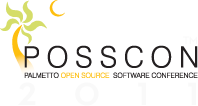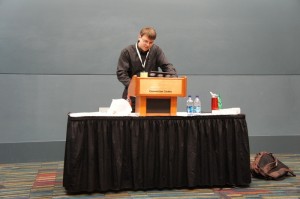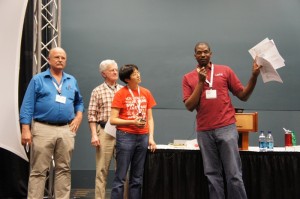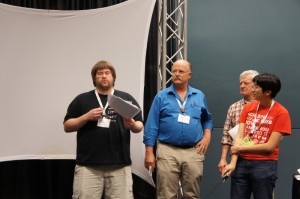Curious artifacts: a POSSCON talk

Welcome, in large part, created with the audience.
The goal of the talk was to get audience members to actually look at live open source projects and start analyzing how those projects might fit into a high school or college classroom. When you look at a project, what cool things grab you, and what sort of little annoyances irk you? How can we turn them into the sorts of mini-project-opportunities students can tackle, and how do we build materials and scaffolding around those tasks that can be used as scaffolding - worksheets, reading, discussion prompts, homework assignments, grading rubrics?
This is a big job - so the trick was that our POSSCON talk started on Thursday... and was the kickoff to a conversation we continued online. Our intrepid audience volunteer Kevin came up and modeled the beginning of a first-contribution conversation using the original bounty Sebastian posted on Tuesday night, then the crowd split into teams and attacked printouts of FOSS artifacts with red and blue pens and highlighters. And smiley face stickers. Always gotta have the smiley face stickers. The audience critiques are available here (pdf).
Here's the flyer that was handed out during the talk in lieu of slides (available in pdf and odt format for remixing) to guide participants through some of the tools, terminology, and cultural quirks they'd be encountering as they looked through the material to critique.
One big analogy used throughout the talk was open source as a cultural immersion experience similar to study abroad. This theme was used for the beginning and end. Some key points made:
- Study abroad is not just about taking the same math class in Paris that you could take back in Wisconsin. It's about the experience of being in Paris - language, culture, transit system, food - math class is almost incidental. It's the same way for open source. Students need to watch, appreciate, be prepared for, and make time for things outside their course material in order to really benefit from the experience.
- You'll be in an unfamiliar environment. Simple things will be awkward at first - ordering a glass of water, fixing a simple bug. Keep going - yes, you could order water in English, but you're in China so you can learn how to do it in Mandarin! It does get much, much easier after the first time or two.
- The point is to get out and experience the culture. Immerse yourself. Don't just hang out with other expats or foreign students. Whenever possible, bring your students into the real world, real conversations, real materials... the point isn't memorizing all the Italian verb conjugations perfectly, but to communicate with someone in Italian, no matter how broken. You'll learn through conversation, so get out there and talk!
If you were at our POSSCON talk and want to add materials - comments, pictures, thoughts, anything - to this post, leave a comment.
Thanks for listening!
--Mel and Sebastian
Some pictures from the talk courtesy of Zenith Chua (thanks, Mom!)
[caption id="attachment_2870" align="alignnone" width="300" caption="Our brave audience volunteer Kevin explains his critique of Bug #180 in the Fedora QA trac."]  [/caption]
[/caption]
[caption id="attachment_2871" align="alignnone" width="300" caption="An audience review of the Fedora Design team's meeting logs and bounties. I believe smiley face stickers were involved."] [/caption]
[/caption]
[caption id="attachment_2872" align="alignnone" width="300" caption="Verdict: Sugar on a Stick's websites contain way too many unexplained acronyms. We should do something about that."] [/caption]
[/caption]